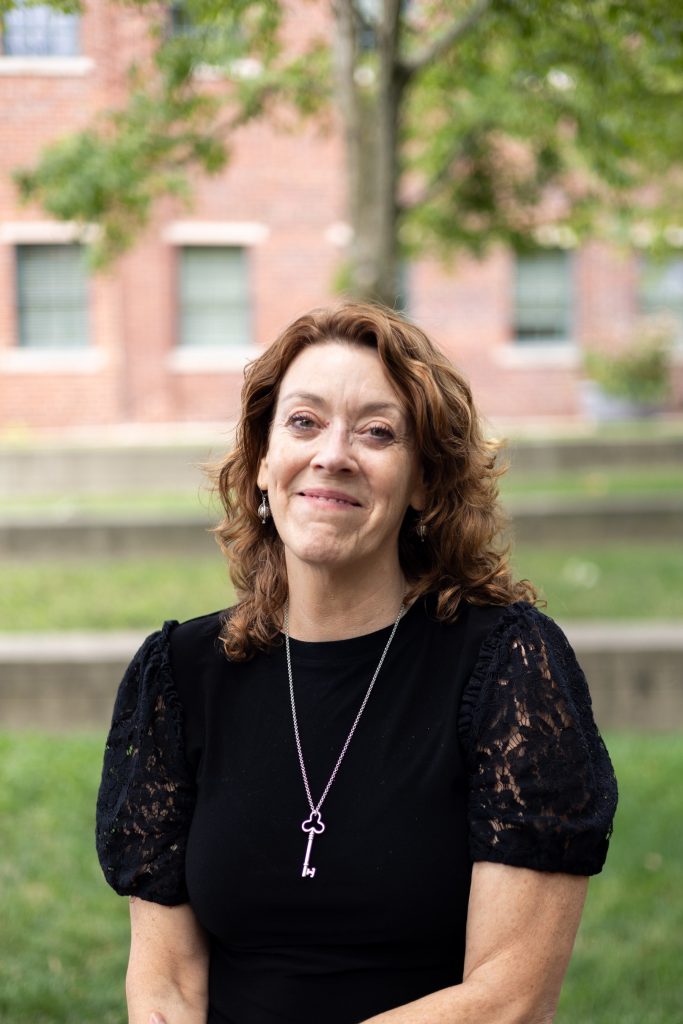People of Housing Security:
Stephanie LaFontaine
Affordable housing program manager for City of Bloomington HAND
brings extensive background to her new role.
Stephanie LaFontaine is a program manager focused on affordable housing with the City of Bloomington’s Housing & Neighborhood Development (HAND) department. She’s been in that newly created position since April.

But her roots in housing run deep, intersecting with her background in clinical psychology.
Those issues first converged when she worked as a clinician at a rape crisis center in Georgia during the 1980s, while getting a master’s in clinical psychology from Appalachian State. She would encounter women who were in abusive relationships with family members and “some didn’t feel like they could leave because of housing.”
Stephanie moved to Bloomington in the mid-1990s, developing a new residential program for Amethyst House to support women with addictions. “Through that process I realized that the vast majority of women who needed that program were homeless.”
The networking she did as part of that effort – including with a group that called themselves the “Three Houseketeers” – helped her learn about federal grant opportunities through the U.S. Dept. of Housing & Urban Development (HUD). Certain HUD grants required the creation of a Continuum of Care, which Stephanie developed for Bloomington. The document detailed local resources for housing and supportive services, and described how community organizations were working together to address housing insecurity.
That original Continuum of Care housing network later became regionalized, and the state required that a lead entity be identified for each region. “So I just put down South Central Housing Network, and that’s how it was named,” Stephanie recalled. She chaired the group for about 12 years, and led the process to incorporate as a 501(c)3 organization.
Several projects resulted from the network’s collaboration, including the Stepping Stones program for homeless youth and an annual fundraising event called Homeward Bound that ran for five years. The South Central Housing Network is still the lead entity for Region 10, covering Monroe, Morgan, Lawrence, Owen, Greene and Martin counties.
During this period Stephanie also began working as a grant writer for the Center for Behavioral Health. She did a lot of grant writing to fund housing and clinical programs, and did consulting for other nonprofits as well. In 2014 she secured funding for a new integrated health clinic in Spencer, and ran it as a partnership of Centerstone and Johnson Nichols Health until 2017.
Her work with Centerstone continued as a housing initiatives strategist from 2017 until mid-2022. She served as team lead for the $11 million project to build Kinser Flats, a 50-unit permanent supportive housing development in Bloomington. It was the first project for homeless persons with substance use disorders in Indiana using the Housing First model with an on-site team of service providers.
Stephanie’s extensive background made her a great fit for her current job at HAND. Part of her role focuses on workforce housing, which typically targets people earning between 80-120% average median income (AMI). The need for workforce housing is crucial because “we have people who can’t afford to live here who work here,” she noted.
Zoning changes made by the city in 2019-2020 provided incentives for developers to include workforce housing as part of their development. There’s also the option of providing payment in lieu of building workforce units. Those dollars go into the city’s Housing Development Fund, which is used to support housing projects. Part of Stephanie’s job is to determine how the HDF money can be best used.
“There’s a need for housing for people of all ages. We need to be designing and creating housing and community that works for everyone.”
Stephanie LaFontaine
Stephanie also is working to help the city distribute its recent $2 million award in HOME-ARP funds. Those funds will be used to provide housing and support services for people experiencing homelessness.
Another significant part of her work is tied to the Hopewell neighborhood that the city is developing on the site of the former Bloomington hospital. About 20% of the residential development there is targeted for affordable housing, which includes workforce housing but also units for lower-income residents.
Stephanie also plans to explore other housing models for the city, such as co-housing and the concept of lifetime communities. “There’s a need for housing for people of all ages,” she said. “We need to be designing and creating housing and community that works for everyone.”
Stephanie serves on the Middle Way House board of directors and is a former board member for WeBloom, a nonprofit that operates Recovery Cafes in Indiana.
With a Ph.D in human development from Indiana University, Stephanie has taught developmental psychology to IU students studying to be teachers. Part of her course included a section on poverty and homelessness, to raise awareness of its impact on their future students’ lives. It was eye-opening to many, Stephanie said.
Outside of work, Stephanie is a lap swimmer and hiker. “I keep grounded by sitting in the woods and listening to the barred owls call back and forth in the evening.”
About the People of Housing Security: This series highlights the work of those committed to improving the lives of residents in South Central Indiana. Find all the articles in this series here.

